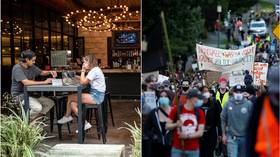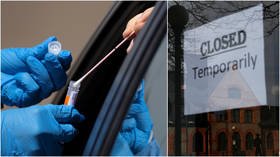Massive protests? Crowded chain stores? No, it’s SMALL BUSINESSES to blame for post-lockdown Covid-19 spike, says MSM

Looking for someone to blame for the post-lockdown case spike that has some states reimposing coronavirus lockdown measures? Go no further than your local small businesses, say media outlets urging a return to lockdown.
Many states have reported unsettling rises in Covid-19 cases in recent weeks, so much so that states like Texas and Florida have put the brakes on allowing bars, restaurants, and other places people gather to resume operations in the last week, insisting it’s too dangerous to continue. Local and national media have been quick to point the finger at those small businesses that gave lockdown-crazed Americans a tiny taste of their pre-pandemic lives, insisting it was these nods to the “old normal” - getting a drink with friends at the bar, or grabbing lunch with a relative at the corner restaurant - that are to blame for the recent case spikes.
Also on rt.com Florida and Texas close bars and scale back reopening, after spike in Covid-19 casesBut this rush to pin the case increases on small businesses reopening ignores several other potential causes of the uptick - the most obvious being the massive protests against police brutality that have thronged the streets of American cities large and small for the past month, rarely taking note of anything like social distancing and sometimes degenerating into rioting and violence. The focus on small businesses also ignores the continued role of big-box stores and chain restaurants - which have also seen heavy traffic as restrictions are lifted, yet somehow seem immune (no pun intended) to the media scoldfest.
A “healthcare worker” in Jacksonville, Florida claimed in a Facebook post earlier this month that she and 15 friends took advantage of the state allowing bars to reopen earlier this month, gathering for a drink at their local watering hole, only to all be laid low by the coronavirus. The moral of the story, as she made clear, was that the friends were wrong to attempt to find joy in their post-lockdown lives, and (presumably) should have stuck to drinking at home and commiserating over Zoom. Dozens of outlets ran with the story, even though there would be no logical way to tell the friends all caught it from one night out at the bar. Just hearing about the outbreak triggered other bars in the city to re-close their doors in fear, and as of Monday Jacksonville has not only reversed its reopening but slapped a mask mandate on its residents.
The narrative - “even though you don’t have to anymore, it’s best to still stay home, because the virus is everywhere” - proved irresistible, and similar stories have been published everywhere from Texas to Michigan. The Hill even published an op-ed by a “small business consultant” apparently looking to scare up some business by preemptively blaming the entire small business sector for the case spike. Meanwhile, big-box stores like Walmart and chain fast food restaurants were all but overlooked in the scramble to pin the “second wave” on the little guy - even though the heavily-trafficked superstores especially would seem to be natural viral incubators, especially given their tendency to attract deodorant-licking pranksters and other attention-seekers eager for their 15 minutes of social media infamy.
It’s entirely possible some of these people really did catch the virus from their one night out drinking with friends after three months of faithful lockdown. Yet even as media outlets appeared to delight in fingering beloved neighborhood bars or popular restaurants for supposedly reigniting the flames of the pandemic, the George Floyd protests that convinced many to ditch their scrupulous adherence to social distancing and join the roiling mass of humanity in the streets demanding justice seem to have flown under their radar. While some tried to cite a factually-dubious scientific paper from the National Bureau of Economic Research, which struggled mightily to absolve the protests from any role in subsequent case spike, even the paper itself never claimed the protests didn’t transmit coronavirus - it merely made the (utterly unverifiable) claim that people in cities that held protests were choosing to stay home more because of the protests.
US hospitals saw a steady decline in COV+ patients from 4/15 to 6/15. in the last 10 days, they have seen a change in this trendmany have sought to blame this on "re-opening"but his this a credible claim?perhaps notinfection to hospital is 11-14 days.so let's look back pic.twitter.com/tNQS0OyeMo
— el gato malo (@boriquagato) June 26, 2020
Not only does statistical analysis appear to show the start of the demonstrations coinciding with a reversal of fortunes for the US’ pandemic numbers, but states with higher post-lockdown numbers weren’t necessarily the ones throwing wide open the doors to their bars and restaurants, either.
the curves all have the same shape, only degree is different. many of the states being pilloried for their "reckless re-opening" have actually opened LESS than the US average, not more.this poses further problems for the idea that "opening" is our culprit. pic.twitter.com/vlSklUZTia
— el gato malo (@boriquagato) June 26, 2020
There’s no definitive way to trace transmission of the virus to the protests, of course - certainly not when New York City’s contact tracers are forbidden from even asking the people they call if they’ve attended one. And given the unalloyed enthusiasm most mainstream news organizations displayed for the protests, it would be downright embarrassing for them to admit that it’s possible to catch a virus while demonstrating for racial justice. But before Americans scrap their brief post-lockdown experiments with freedom and run back into the claustrophobic confines of their stay-at-home orders, never to gather with friends in public again, they might take note of these outlets’ conflicts of interest. After all, what guarantees ratings better than a homebound captive audience?
Like this story? Share it with a friend!















